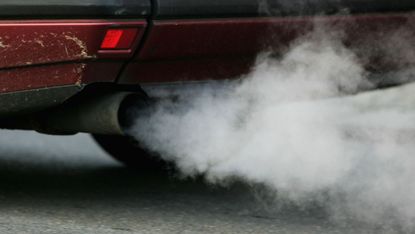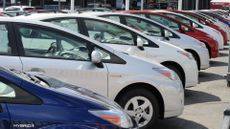Diesel fallout blamed for rise in new car CO2 emissions
Negativity around the fuel has pushed buyers towards petrol cars

Average carbon dioxide (CO2) emissions for new vehicles have risen for the first time in 14 years, as consumers opt to buy petrol cars rather than diesel versions.
Data from the Department of Transport uncovered by the BuyaCar website reveal that average CO2 emissions for new cars “were 121.1g/km over the first ten months of 2017, and are on course to exceed the 120.3g/km recorded last year”, reports Auto Express.
The rise in emissions is believed to be down to falling sales of diesel-engined vehicles, which produce less CO2 than their petrol counterparts.
Subscribe to The Week
Escape your echo chamber. Get the facts behind the news, plus analysis from multiple perspectives.

Sign up for The Week's Free Newsletters
From our morning news briefing to a weekly Good News Newsletter, get the best of The Week delivered directly to your inbox.
From our morning news briefing to a weekly Good News Newsletter, get the best of The Week delivered directly to your inbox.
Car dealers sold 16% less diesels this year than they did in 2016, because of “tax rises, stiffer parking charges and threats of inner-city bans for diesel cars”, says the magazine.
The figures may cause headaches for carmakers and regulators, says Motor1, as the European Union has set an average emissions target of 95g/km by 2021.
A DfT spokesperson said: “we will seek to maintain ambitious targets and our leadership position, and intervening firmly if not enough progress is being made.”
But British Vehicle Renting and Leasing Association (BVRLA) chief Gerry Keaney blames the Government’s negative attitude to diesel vehicles for the shift towards petrol cars, reports Motor1.
Keaney said: “We currently have a poorly designed tax environment that encourages people to make their own arrangements rather than choosing a company car. This is putting older, higher-polluting grey fleet vehicles on our roads.”
Create an account with the same email registered to your subscription to unlock access.
Sign up for Today's Best Articles in your inbox
A free daily email with the biggest news stories of the day – and the best features from TheWeek.com
-
 India elections start amid violence, hate speech accusations
India elections start amid violence, hate speech accusationsTalking Points Narendra Modi seeks a third term while critics worry about the future of the country's democracy
By Joel Mathis, The Week US Published
-
 'Biden is smart to keep the border-security pressure on'
'Biden is smart to keep the border-security pressure on'Instant Opinion Opinion, comment and editorials of the day
By Harold Maass, The Week US Published
-
 Bird flu worries mount as virus found in milk, cows
Bird flu worries mount as virus found in milk, cowsSpeed Read The FDA found traces of the virus in pasteurized grocery store milk
By Peter Weber, The Week US Published
-
 The pros and cons of a tourist tax
The pros and cons of a tourist taxPros and Cons Visitor levies can boost tourism but a lack of transparency troubles critics
By The Week Staff Published
-
 The pros and cons of hybrid cars
The pros and cons of hybrid carsPros and Cons Part-electric vehicles produce lower emissions but they may not work for every lifestyle
By Ellie Pink Published
-
 Sport on TV guide: Christmas 2022 and New Year listings
Sport on TV guide: Christmas 2022 and New Year listingsSpeed Read Enjoy a feast of sporting action with football, darts, rugby union, racing, NFL and NBA
By Mike Starling Published
-
 House of the Dragon: what to expect from the Game of Thrones prequel
House of the Dragon: what to expect from the Game of Thrones prequelSpeed Read Ten-part series, set 200 years before GoT, will show the incestuous decline of Targaryen
By Chas Newkey-Burden Published
-
 One in 20 young Americans identify as trans or non-binary
One in 20 young Americans identify as trans or non-binarySpeed Read New research suggests that 44% of US adults know someone who is transgender
By The Week Staff Published
-
 The Turner Prize 2022: a ‘vintage’ shortlist?
The Turner Prize 2022: a ‘vintage’ shortlist?Speed Read All four artists look towards ‘growth, revival and reinvention’ in their work
By The Week Staff Last updated
-
 What’s on TV this Christmas? The best holiday television
What’s on TV this Christmas? The best holiday televisionSpeed Read From films and documentaries to musicals for all the family
By The Week Staff Published
-
 Coco vision: up close to Chanel opticals
Coco vision: up close to Chanel opticalsSpeed Read Parisian luxury house adds opticals to digital offering
By The Week Staff Published